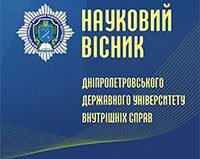Volodymyr YEFIMOV, Dmytro SANAKOYEV
YEFIMOV V., SANAKOYEV D. (2022), THEORETICAL APPROACHES TO THE RESEARCH OF COMBATING CRIMINAL OFFENSES COMMITTED BY ORGANIZED GROUPS AND CRIMINAL ORGANIZATIONS, Scientific Bulletin of Dnipropetrovsk State University of Internal Affairs, Special Issue № 1, 197-202
DOI: 10.31733/2078-3566-2022-5-197-202
ABSTRACT. Today, a comprehensive (integration) approach combining preventive and repressive measures is implemented in European countries. They are covered by the term “antidote”. Why exactly this term, and because it is a general generic concept that covers activities aimed at minimizing contradictions and factors that generate or contribute to crime, at reducing certain types of crimes by preventing their commission at various stages of criminal behavior (crime prevention measures), as well as adequate response measures to already committed crimes (repressive approach).
However, in many respects, the views of domestic scientists at the theoretical level coincide with the positions of foreign scientists. Nevertheless, until now, the implementation of scientific developments and recommendations in the practice of the subjects of combating organized crime and the adoption of normative acts remains a problem in Ukraine. As for the analysis of crime, it is used as an effective preventive measure, which provides a number of methods and measures for understanding the depth of the essence of the complex relationship between the suspect, the criminal activity and the circumstances that contributed to it. This analysis of crime is used in practice to prevent and deter both all crime and its various types. The use of operational analysis during pretrial investigation and strategic analysis within the framework of the formation of law enforcement policy directions plays a very important role. Primarily for tactical analysis, it is extremely appropriate for crime analysts to be involved in a complex investigation from the outset or when the complexity of the process becomes apparent.
Keywords: prevention, counteraction, organized crime, terminological and strategic concepts, comparative analysis, law enforcement officers of Ukraine, European countries, preventive strategy of analysis of criminal patterns.
- References:
- Golina V. V. Criminological policy in Ukraine: some theoretical and applied problems. Visn. Acad. of Law Sciences of Ukraine. 2008. No. 2. P. 182-190. [in Ukr.].
- Zakaliuk A. P. Kurs suchasnoyi ukrayins’koyi kryminolohiyi: teoriya i praktyka: U 3 knygah [Course of modern Ukrainian criminology: theory and practice : In 3 books]. Kyiv: In Yure, 2007. Book 1 : Theoretical foundations and history of Ukrainian criminological science. 321-367 p. [in Ukr.].
- Kryminolohiya: Zahal’na ta Osoblyva chastyny [Criminology: General and Special parts] / ed. by V. V Holina. National law Acad. of Ukraine named after Yaroslav Mudryi : 2nd edition processed and added. Kharkiv: Pravo, 2009. P. 53. [in Ukr.].
- Litvak O. M. Derzhavnyy kontrol’ za zlochynnistyu (kryminolohichnyy aspekt) [State control of crime (criminological aspect)]: diss… of Doctor of Legal Sciences: speciality 12.00.08. Kharkiv, 2001. 359 p. [in Ukr.].
- Levi M. The Preventative Control of Organised Crime in Europe: The EmergingGlobal Paradigm? International Key issues in Crime Prevention and Criminal Justice: papers in celebration of 25 years of HEUNI. Helsinki, 2006. P. 93.
- Repetskaya A. L. Transnational organized crime: characteristics, causes, control strategies. Irk. : IGEA Publishing House, 2001. P. 195. [in russ.].
